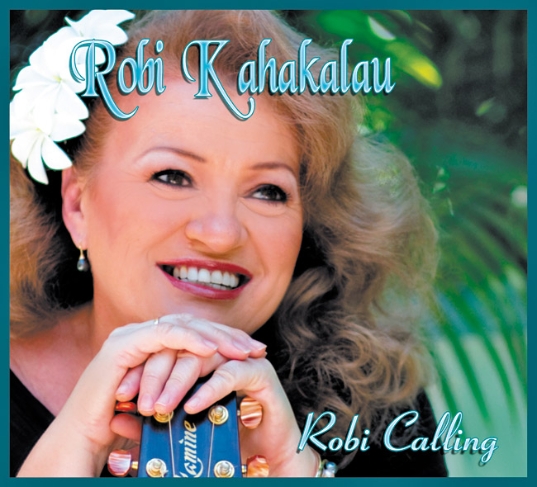Robi Calls Again
An instantly recognizable voice is never easily forgotten. And when that voice is put to memorable music, well, the result is often a classic tune.
Robi Kahakalau, better known as Sistah Robi, has always fallen into this category. During the ’90s she spoiled fans with more than a handful of time-honored songs, highlighted by the playfulness of Pii Mai Ka Nalu and the warmth of Makua, not to mention those signature duets with the Hawaiian Style Band (Love and Honesty) and Kealii Reichel (the Diane Warren-remake Every Road Leads Back to You).
Pity that it’s been so long – 13 years, to be exact – since we last heard her sweet, soulful vocals on anything new as a solo artist. Her noticeable absence from the local music milieu, in fact, has had admirers wondering if she had quietly drifted into retirement.
But with the release of Robi Calling, her fourth solo effort and first since her turn-of-the-century album All I Want, Kahakalau proves she isn’t quite ready to call it a career.
“It’s been an extremely long time; it really wasn’t supposed to take this long!” says the German-born artist about her latest album. “But I’m grateful to have a project out again, and grateful to let people know I haven’t retired.”
Kahakalau tells me that financial constraints and the lack of a support team contributed to her decision not to release anything new during the first part of the decade. But once Bob and Pati St. John of Neos Productions entered the picture a few years ago, she finally had the necessary backing to begin work on her fourth album project.
“My first three CDs I did on my own and they took really long to finish,” explains Kahakalau, who’s also noted for her multi-lingual expertise. “But when Bob and Pati approached me about the idea of releasing another CD, I jumped at the opportunity. They’ve been a tremendous help and allowed me to just focus on my music. I’m really enjoying this album more.”
She handpicked the CD’s 12 songs, which include Kaulana O Waimanalo, an ode to the Windward Oahu town and location of one of her favorite beaches; Tera Mai Te Tiare, the first song she ever learned in Tahitian; Na Pali Alo Lua, written by older sister, Dr. Ku Kahakalau; and the Bonnie Raitt-penned song Come to Me.
“If I have an idol, it’s Bonnie Raitt,” confesses Kahakalau. “I opened for her in ’97 and I was speechless; I’m rarely ever speechless. But Come to Me was (local singer/guitarist) Jeff Rasmussen’s idea. He suggested covering that song and I was like, ‘Shoots! Put ’em on the album.'”
Here’s what else Sistah Robi told Musical Notes:
MN: Many fans first came to know you during your time with the Hawaiian Style Band. Did the band recruit
you specifically to help sing lead?
RK: Actually, Wade (Cambern) and Bryan (Kessler) didn’t want me to sing at first; they just wanted me to help them with the songs that contained the Hawaiian language. What happened was we were working on Kauai Nani La and I noticed they were having trouble with the lyrics, especially pronouncing the word Waialeale. So I told them they could lay down a scratch track of me singing the verse, which they could later go back and listen to, and then copy me to get the pronunciation right. I guess they liked what they were hearing because they asked if I would continue singing with them.
MN: Before earning the gig with the Hawaiian Style Band, you were doing the Waikiki nightclub circuit during most of the ’80s, right?
RK: Oh, yeah. I was playing at Shorebird’s, playing with the Kaau Crater Boys and others here and there, and basically playing for little pay and even less attention.
MN: You left Germany more than 30 years ago. What made you decide to settle here?
RK: My sister Ku and I always said that once we graduated from school, we were done with Germany. One day Ku met a soldier on the base where she worked as a civilian translator. He noticed her nametag and last name, and told her he was from the Islands. Soon, soldiers from Hawaii were coming to our house, a home away from home for them, and playing music they brought from back home: Kalapana, C&K, Sunday Manoa. Once I heard their Hawaiian music, I was sold. And because of them, I realized that I had to find out more about my heritage. That would only come with me moving to Hawaii.
MN: Have you been to Germany lately?
RK: Yes, two years ago. It was the first time I had been back in about 20 years. But after two weeks there, I was ready to come home. You know, I may have been born in Germany, but I was made in Hawaii.






